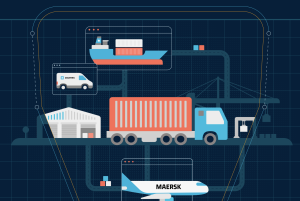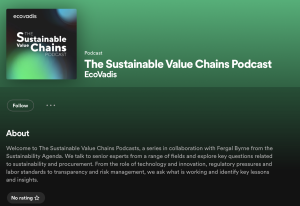 It’s an exhilarating time. The environmental revolution is here and companies all over the world are coming up with extraordinary products and ideas that will change the way we think and live, Howard Stephens, CPO at Nedbank, tells SmartProcurement.
It’s an exhilarating time. The environmental revolution is here and companies all over the world are coming up with extraordinary products and ideas that will change the way we think and live, Howard Stephens, CPO at Nedbank, tells SmartProcurement.
When you have over 4000 suppliers and each one of them knows that your requirements are green, the knock on effect in environmentally responsible behaviour is vast.
In an effort to lead in matters green, Nedbank has been encouraging its suppliers to go green for several years.
![]() “At Nedbank we regard sound environmental practices as a positive business driver,” says Stephens, whose team control or influence all products and services used by the Nedbank Group.
“At Nedbank we regard sound environmental practices as a positive business driver,” says Stephens, whose team control or influence all products and services used by the Nedbank Group.
“We insist on environmentally friendly practices in our tender documents and, when registering, our suppliers fill in an environmental questionnaire. They all understand and have chosen to change and grown with us.
“Environmental sustainability and sound environmental practices are foremost on people’s minds these days. It’s not like ten years ago when these were foreign terms. In addition to meeting our standards, our suppliers are coming up with innovative ways to improve their carbon footprint.
“Nedbank’s car rental suppliers have implemented a number of initiatives, from washing cars with ‘grey’ water to introducing a new carbon offset initiative that will offer customers access to a certifiable and sustainable carbon offset programme. They are also looking to introduce a fleet of small, economical, petrol-electric cars that will be less expensive than other hybrid vehicles currently available. All of Nedbank’s staff have shown interest in hiring these cars.
“In the meantime we are encouraging everyone in the group to hire vehicles with engine capacities of 1,6-litres or less. Gas guzzlers are not suitable from an environmental and financial perspective,” Explains Stephens.
Similarly, Nedbank is measuring its staff members’ carbon emissions from their private vehicles, as part of the group’s total carbon emission reduction drive. The same applies to air travel, also monitored through Stephen’s office.
“The flight companies are bringing in more fuel efficient planes. Kulula, for example, is replacing its fleet. Nedbank supports this as part of our carbon emission reduction drive. We are also encouraging less air travel across our group, with more video- and tele-conferencing and webcasts.”
As part of a global move to encourage greater telecommunication throughout the business world, Nedbank belongs to a forum of 200 international companies, called the Corporate Executive Board. Members give presentations and receive feedback through tele- and video-conferencing and webcasts with up to 100 international participants.
“Environment friendly initiatives are really going to start stepping up over the next couple of years,” says Stephens.
Inside out and outside in, Nedbank is sweeping green
From the cleaning products used to the furnishings and lighting chosen, all suppliers are selected according to their environmental record.
“The furniture we have selected for our flagship green building is constructed from 57% recyclable material, plus all the timber used in this building is sustainably harvested and accredited by the Forest Stewardship Council,” explains Stephens.
Phase II of Nedbank’s head office campus at 135 Rivonia Road is set to become the first commercial building in South Africa to receive a 4-star Green Star SA rating from the Green Building Council of South Africa (GBCSA). While the Green Star rating focuses on construction and building design aspects, Nedbank has taken the extra step of making sure the interior layout and office activities also comply with green building best practice. This approach extends to its 13 campuses and offices countrywide, where Nedbank is on a staff drive to live green, reduce waste, increase recycling and re-use wherever possible. Paper is high on this agenda.
“The whole of Nedbank is on a paper recycling and usage-reduction drive,” says Stephens. Nedbank’s Retail division alone has saved over R1-million through its paper reduction programme between January and July 2009.
The Nedbank Group is supplied with paper produced by the Mondi and Sappi paper mills.
“We have visited both mills to assess their environmental practices. We have also visited the environmental conservation projects they support, such as Mondi’s wetland conservation project outside of Howick in KZN.
“Together with our conservation partner, WWF, Nedbank assess what we call the ‘cradle-to-file costs’ of paper usage, which tracks the paper production process, all the way through to transporting it to our offices. This way we can assess the environmental cost and work out our total carbon footprint.
“Reduce, re-use and recycle is the motto at Nedbank, where items like printer cartridges for older machines are recycled and re-used as much as three times.
“Each item, small and large, is carefully assessed. This includes the food and drink supplied to our group, with a move towards more organic foods and away from bottled water.
“We used to supply bottled water until we worked out that the environmental damage linked with manufacturing and transporting plastic bottles was significant when compared with installing filtration plants in our offices and drinking filtered water from the tap,” says Stephens.
From clean water to clean offices, Nedbank is now using revolutionary, environmentally friendly cleaning chemicals. Dirt-consuming bacteria harvested from pristine indigenous forests by Canadian organisation InnuScience are added to South African produced cleaning products.
The chemistry of these products is completely different to the chemistry of conventional hard chemicals.
Consumers are taught that cleaning agents get rid of all bacteria, which gives the impression that all bacteria are bad, which is not correct. There are very many good bacteria, which Nedbank’s green cleaning system makes use of to do the cleaning, says Stephens.
“This is a wonderful example of how ‘going green’ is not just about changing products or services, it’s about changing mindsets,” he says.

























